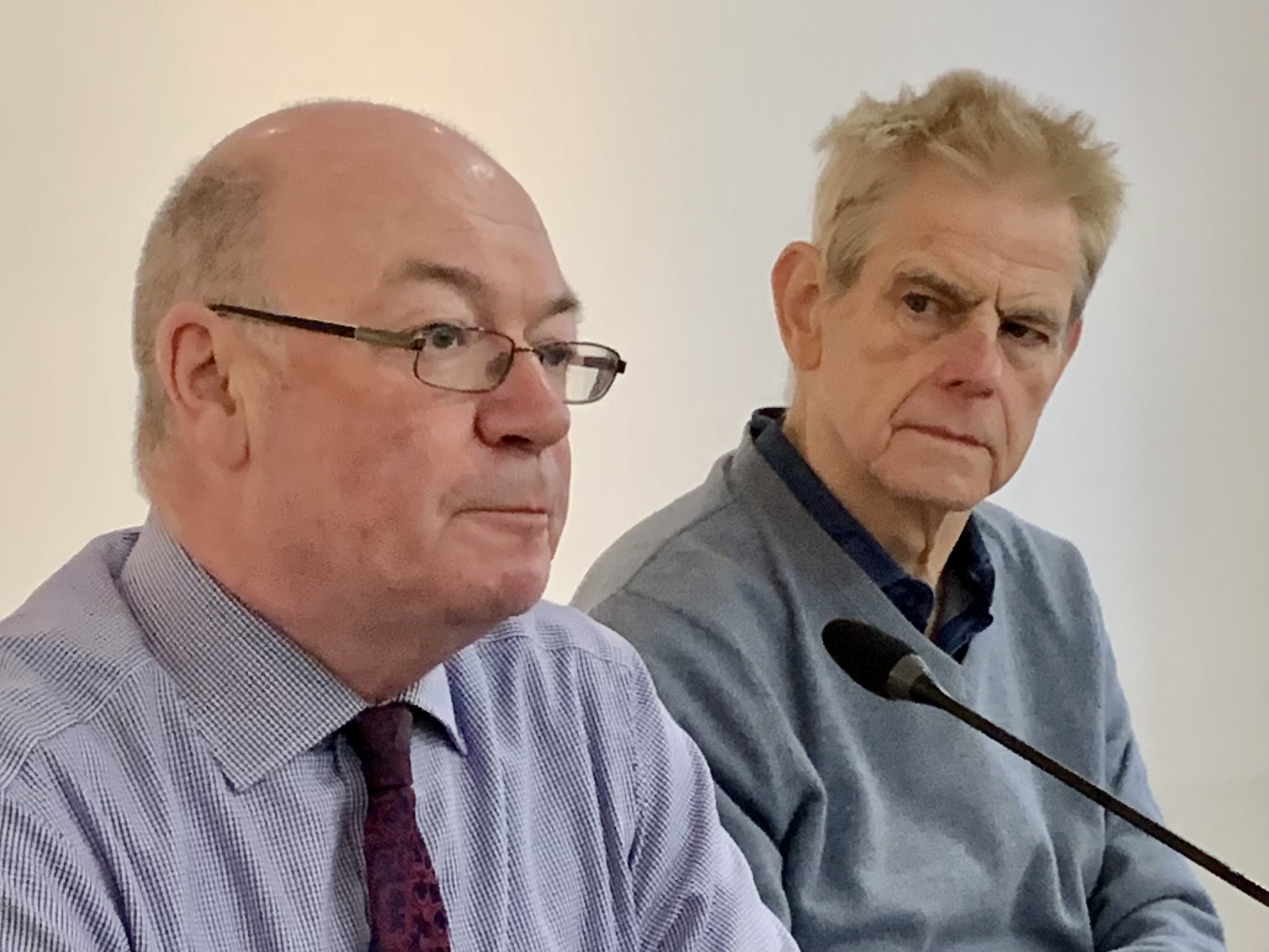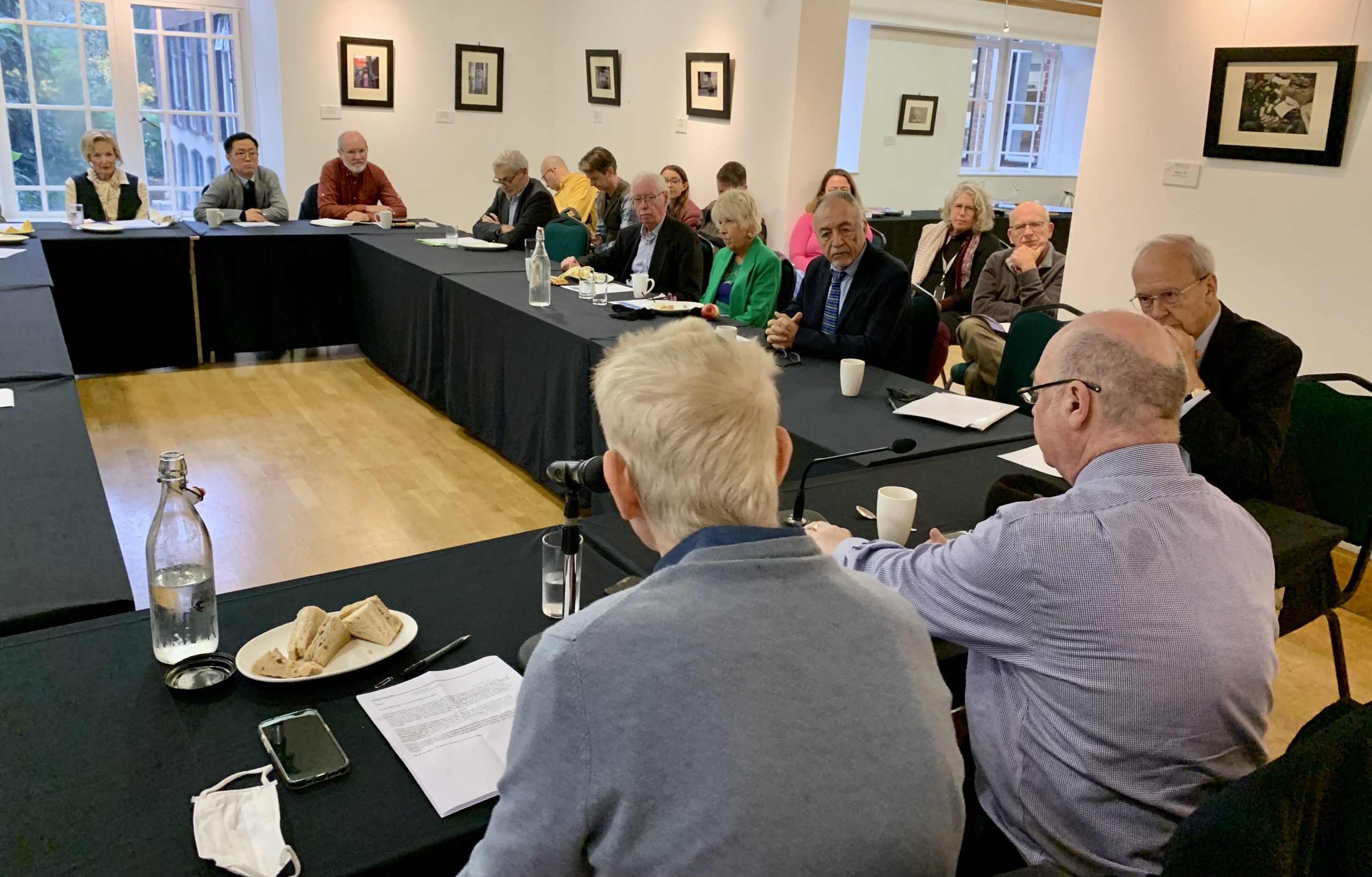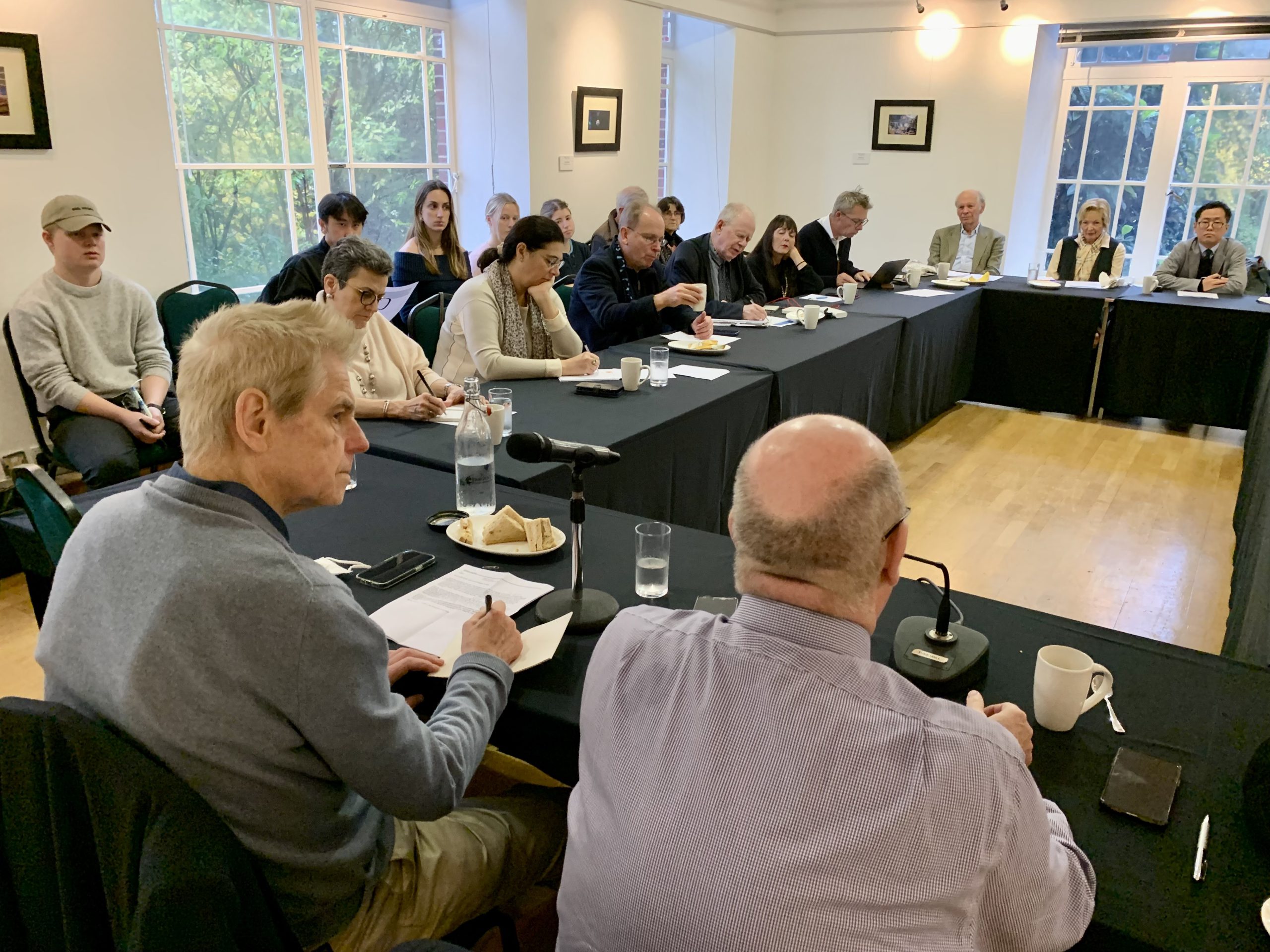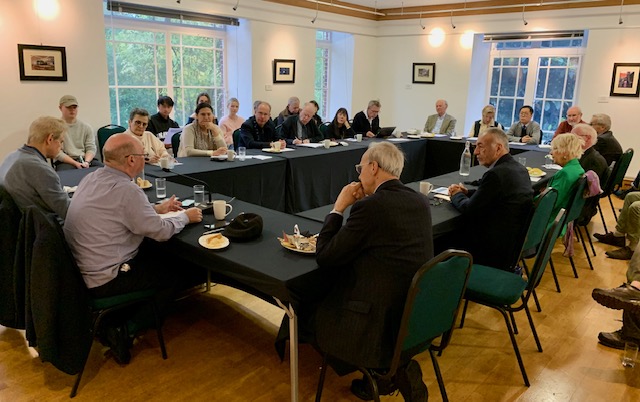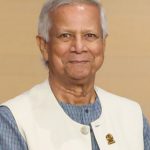How to end the war between Israel and Hamas and make it last is a most difficult challenge that was examined by Alistair Burt, the UK’s former minister for the Middle East and North Africa, at an AEJ lunch meeting on 14 November.
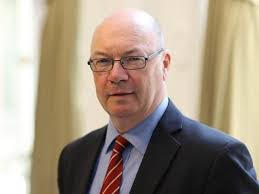
Israel-Gaza war- What chances for co-existence now?
By Firdevs Robinson, independent journalist and commentator
On Tuesday 14 November, the 39th day of the Israel-Gaza conflict, the AEJ UK hosted the former Foreign Office minister Alistair Burt at its lunchtime meeting. The theme of his talk was “How can we ensure this conflict is the last great tragedy for Israel and Palestine”.
Triggered by Hamas’ October 7th attack in southern Israel, the latest cycle of violence and reprisal, marked by unprecedented ferocity and the soaring civilian death toll, is like no other in the long history of the Israeli-Palestinian conflict.
The human catastrophe unfolding in Gaza has brought shock, anger, and despair to many. But some of those most closely engaged with the region, among them Alistair Burt, had been warning that something ‘very bad’ was going to happen.
“The rising tension on the West Bank was obvious. The incursions by the Israeli Defence Force seeking terrorists -as they are entitled to do- but endangering civilians, casualties growing in number over a period of time they were doing it; violence of the settlers, the uncertainty over Al Aqsa Mosque, the composition of the Israeli government post November last year, with avowed extremists in it including those with a terrorist background – all made a vast amount of discomfort.”
Writing for The Arab News in February this year, Burt called on the UK government to use its convening power to “move towards some discussion about a peace process”.
Warning about the spiralling tensions in recent times, he told the meeting: “I would rather the UK was queried for challenging the hopelessness of the situation today than organising the evacuation of its citizens tomorrow”.
As a Conservative Member of Parliament for Bury North and Northeast Bedfordshire for 32 years, Alistair Burt held ministerial office for eleven years, including at the Foreign Office as the Minister of State for the Middle East and North Africa.
Presently, Pro-Chancellor of Lancaster University, he is a member of the International Commission on Missing Persons, a Distinguished Fellow at the Royal United Services Institute (RUSI), and works closely with a number of NGO’s and conflict resolution groups engaged with the Middle East, among them Terrestrial Jerusalem, led by an Israeli attorney Danny Seidemann.
With the group, or individually, Alistair Burt keeps in close touch with the region’s leaders, politicians, diplomats, and civil society leaders.
“My sense from all the people I have spoken to, there is no status quo anymore. We are used to normal flurries, exchanges of rocket fire and arms between Israel and the Islamic Jihad and Hamas and occasionally Hezbollah; everything settles down and we go back to a situation ‘normal’. An occupied West Bank, pressure on Al Aqsa, difficulties in Jerusalem and Gaza and somehow it all settles down. Not this time”.
Alistair Burt said the focus would not be limited to the search for a resolution on Gaza.
“The talks and discussions that are taking place are not about who governs Gaza after all this comes to an end. It is Gaza, it is West Bank, it is East Jerusalem. I don’t think people are going to settle for a situation in which there is not a conclusive process that deals with all this. Because I have been told more than once that if trying to deal with the immediate you have got to have a sense of where we are all going. And it will make it easier to make the decisions on the immediate now if people know there is a path and a track to the future”.
But how? And what path? Taking steps towards a conclusive process has proved almost impossible in the past. After the events of 7 October, which Burt described as “a singular horror and atrocity”, and Israel’s devastating response, what chances now?
Alistair Burt said he had never known anything so fiercely binary, where it is “almost impossible to give any credibility to the context of what we are talking about”.
“It is very clear that the Arab world has one narrative. It is not a balanced narrative. It is all the result of occupation and the like. It is true on the streets, and it is true of many of the states who are trying to deal with this. They put it in that context. On the other hand, the UK, the US, France and others have recognised the pain of Israel and made their statements to stand by Israel which is sometimes misinterpreted as effectively a green light to Israel — which I do not think it is — for them to carry on whatever reprisals they like”.
Burt believed Israel would have to go through some degree of change and Israelis would make their own decision about how soon Binyamin Netanyahu’s rule comes to an end.
“But that doesn’t take away those who vote for the extremist parties, and it doesn’t take away what is happening on the West Bank. When I saw Minister Ben-Gvir handing out semi-automatic rifles to the settlements just last week, it sent a shudder down my spine, because they are not going to be recovered very easily”, he added.
Alistair Burt said Netanyahu government’s declared aim of removing Hamas militarily was understandable as it had to demonstrate to its citizens that they were secure, but it was not yet willing to confront the truth that its actions for such a long period of time have added to the insecurity of its people.
“There is one final paradox. This won’t be concluded until each side recognises that there is no justice for Palestine unless there is security for Israel. There is no security for Israel unless there is justice for Palestine. Negotiators will have to care as much about what the other wants as they do about their own. Because only by caring about what the others want, they will actually achieve their own objectives.”
Burt said he still supported the two-state solution but at the end of the day, “it was not going to be a US, UK, European or the UN shout”. It needed to be ‘urgently and regionally’ led, with support from others.
“This is playing into a divided world at a bad time. All of this will be a benefit to President Putin and to those who seek harm in the world. Takes the eyes of Ukraine and what is happening there. Contributes to a sense of breakdown and break up all around”, he warned.
The ripples of the war go far beyond Palestine and Israel. “We are now confronting a social issue in the UK and the USA, and I suspect in other western countries that we didn’t have before”.
Alistair Burt was asked about the International Criminal Court (ICC) and calls for the court to launch an inquiry into potential war crimes committed by Israel. Both the UK and US governments object, saying that the ICC has no jurisdiction as Israel is not party to the statute of Rome.
Burt said that at some stage, Israel had to accept external jurisdiction.
“I would have put up a strong argument to say that Israel has got to be subject to the same jurisdictions as everybody else. Over the years the idea that Israel is not subject to anybody because everybody else is biased against them – I don’t think that has been a helpful position. Israel is responsible for its actions, and it has to take part now knowing what international humanitarian law is and all that. But if there are no sanctions for what you do, then where is the responsibility? The state of Israel is strengthened by the number of organisations which it adheres to. Providing it is then dealt with entirely fairly in an unbiased manner”.
BBC Radio 4 Today Debate – What Happens When the War Ends?
On the same day that Burt spoke with the AEJ, BBC’s Radio 4 The Today Debate examined the same subject – What Happens When the War Ends? – during which a number of highly informed experts echoed and amplified many of the points raised by Burt.
Sources for coverage:
BBC
The Guardian
Al Jazeera
The New York Times
Reuters
AP
Council on Foreign Relations
The history of Palestine – United Nations
Palestine – Wikipedia
